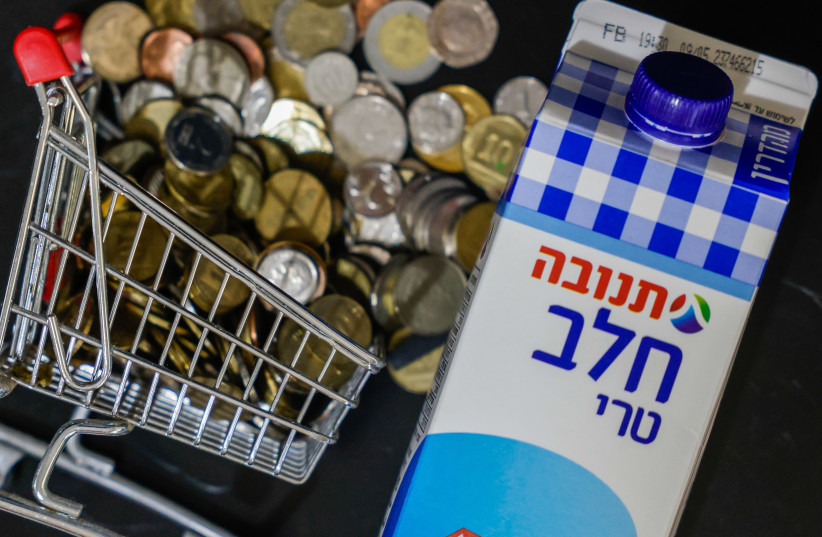
In the fast-paced, exciting world of journalism, especially in Israel, many of the most eye-catching stories relate to politics, diplomacy, military updates, and espionage.
This is all the more true during wartime, when news about the war tends to trump everything else.
But equally as important are the stories of individual people: those grappling with economic crises, taking to the streets in protest, or suffering injustices in domestic institutions.
These stories, often relating to the field of domestic affairs, need to be told, and the people involved need a voice. At The Jerusalem Post, Eve Young is their voice.
The Post’s economics and domestic affairs reporter and host of the Inside Israeli Innovation podcast, Young got her start on the breaking news desk and has experience working with municipal officials. She has gained expertise in the struggles of Israelis who don’t make the front pages of major news outlets – and now she is using these skills to help those stories get the attention they deserve.

This is “Behind the Bylines,” where we bring you a look at the people behind the articles that keep our paper running.
What has your career been like so far?
Interesting, crazy, stressful. It’s a huge privilege, and it’s different almost every day.
I have had some incredible experiences, whether it’s getting to meet people with fascinating stories, perspectives, or knowledge; learning about what they know; or imparting that to other people.
But it can also be really sad and difficult sometimes. Journalism is a pressure-filled environment. And being exposed to bad news and reporting on it can be really depressing.
It’s also hard to witness so much of the cynical side of the news. In journalism, you regularly get exposed to more cynical things. You get to watch people make promises and break them regularly, and it can be really overwhelming and sad.
But on the other hand, it’s also amazing to be part of something as vital as journalism.
Journalism is such a key factor in any modern functioning democracy, and getting to be part of that is such a huge privilege. A lot of people have their understanding of reality from what they read in the paper and online; a great deal of what they understand is from there. Getting to be a part of shaping that reality is a huge privilege, and I am aware of it every day, and I take it very seriously with my writing and working in accordance with journalistic ethics.
It’s a roller coaster with the pressure and privilege: super high highs and super low lows.
Does it help to have so many subjects to write about?
Absolutely. I think I’ve been really lucky that my career thus far has had tons of variety. Not only can I write about different things at different times, but I can also end up working in so many different places. There are weeks where one day I’m in the North and the next day I’m in the Negev meeting all kinds of different people. I also get to record the podcast and collaborate with our social media team – it’s amazing to do such different things.
Writing can become repetitive even if you’re writing about different kinds of topics, but having those opportunities to keep what you’re doing varied is a big part of what I’m doing so far.
Tell me about the importance of your beats.
The main topic I cover is economics – which is basically related to everything. Everything we do these days is impacted by money and the economy. Everything our government does is impacted by the economy, as are our well-being, our welfare systems, and our security. Everything from how much veggies cost at the supermarket, to the quality of the education our children get, how much our doctors’ visits cost, what kind of housing we can afford, what makes secure peace agreements, and how many soldiers a country can afford – it’s all economics.
Economics is also the study of social sciences through quantitative tools, so it can tell us so much about ourselves and our society.
I also cover domestic issues, which includes everything from interviewing released hostages and hostage families to writing about protests, water shortages, and the Israel Police.
It’s crucial to know what is impacting everyday Israelis, where they are being taken care of, and where they are being left behind. Knowing what is going on with the citizens of a country gives an important picture of it that you can’t get anywhere else.
More generally, good journalism is vital to any modern country and for good democracy. Free and fair elections depend on well-informed voters who have access to reliable information.
Tell me one of the most memorable anecdotes of your career thus far.
After we knocked on the door of released Hamas hostage Gabriela Leimberg to interview her, she opened the door and Bella – a tiny dog who was also held in Hamas captivity – ran over to greet us.
After seeing them on TV and crying with relief along with the whole country as they were freed, it was surreal to meet them in a way that no other well-known person has been so surreal to meet.
It was a moment when the full gravity of the stories you are about to hear and share with your readers hits you.
It’s also always memorable sprinting away from police skunk spray cannons when I cover protests. I generally wonder if I am paid enough as I run away!
What advice do you have for aspiring journalists?
Make sure you read a lot. It gives you information, perspective, and helps you be a better writer.
